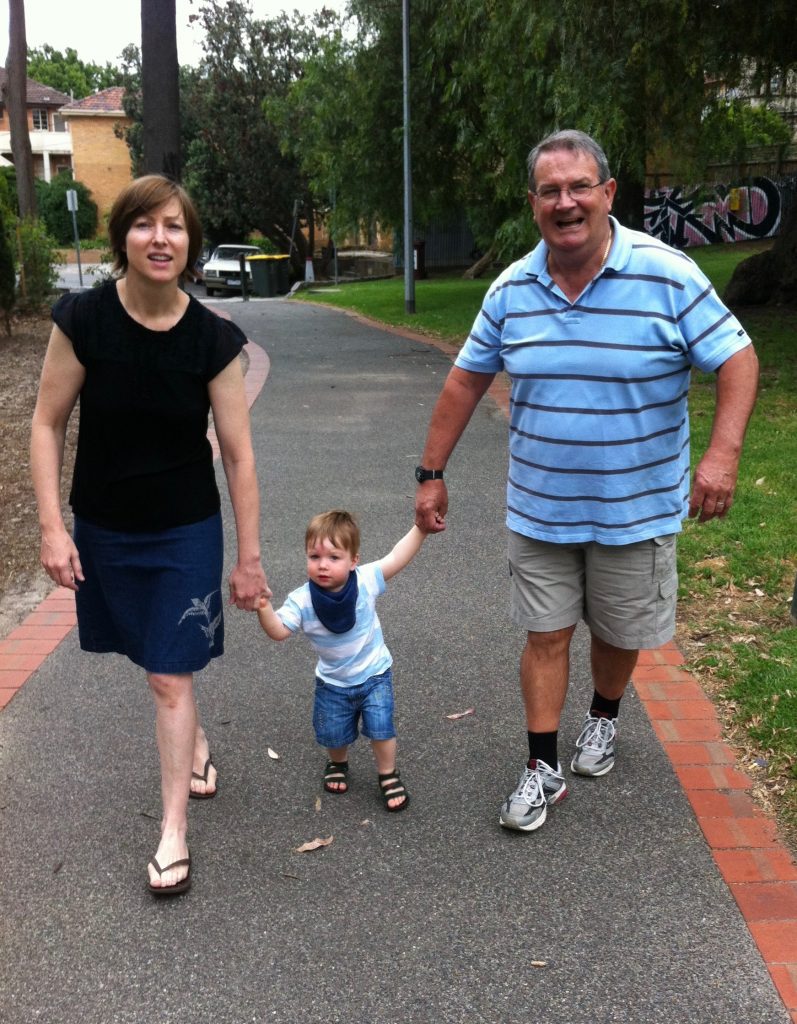BRISBANE–Wrote this in a flourish when dad died. Not quite right then, with so much detail, now found it makes sense.
My father told me that at the ceremony lowering the flag on Rhodesia and raising it for a new Zimbabwe, Robert Mugabe looked at the folded, former ensign dad held and said “you keep it”.
Mugabe, a bad man, was one of three giants that passed this week, three who shaped distinct areas of the world – Mugabe in Zimbabwe, BJ Habibe of Indonesia, and ‘Akilisi Pohiva of Tonga.
The boy from Hobart had touched each of them his own way.

Pete with first grandchild Bowie.
Peter Allan Connors was part of the small force of multinational peacekeepers deployed in 1979-80 for the Rhodesia-Zimbabwe handover.
I asked him many years later “how’d Mugabe work out for ya?” – hoping my smart-arsery could possibly get a rise from someone who still held three passports so did not ever need to go through customs, even approaching 70 years of age.
His evasiveness was the usual stream of mixed messages, entertaining Australianisms and subterfuge, as even after a few beers he knew what our roles where – me being the journalist and he the spook.
At his funeral a couple of weeks ago, the local RSL had to apologise that they didn’t have sapper Warrant Officer First Class and RSM PA Connors’ full service record available, there was a hold-up in Canberra.
I quietly leaned forward to my family and said “they haven’t had enough time to redact it”.
Welcome to the big game
On the evening of Time’s publishing of one of its most influential, and then the most heavily legalled investigations in the magazine’s history, Suharto’s Billions, I was at the elevator door having a cigarette preparing its online rollout.
This was the 30-something floor of a Hong Kong skyscraper in 1999.
You could smoke anywhere those days.
BJ Habibie was radically and somehow peacefully steering Indonesia from a brutal autocracy quickly to a fledgling but functional democracy.
He had given a path for the release of East Timor. There was conjecture about Indonesian Papua.
Pak Habibie was fronting the generals, and both Time and Asiaweek were going at it as hard journalistically as a then-boundless editorial budget could muster.
My father, it turns out, had helped draw the boundary between a free, democratic Papua New Guinea and Indonesia’s Papua as part of a survey team in his youth.
“How’d that work out for ya?” I also recall saying.
Anyway, the lift pinged and a tradesman struggled getting through the security door, trying the pass codes constantly.
He said he had to fix the telephone at the reception desk, just through the secured doors.
I swiped him through and he set about doing something out-of-view at the very offices we could have held all the detail about the massive expose about to drop.
Sitting back at my desk I shook as I realised what I might have done.
Months later, at editor Don Morrison’s going away shindig, I told him about it.
He slapped me on the back of the head. He said something along the lines of “you idiot”.
He said I should have called security to evacuate the building – a 32-something-storey building in Causeway Bay.
I agree. I should have.
Dad, who later oversaw security for the UN in Afghanistan’s Kandahar Province in his 60s wouldn’t have allowed that.
Voice of home
The stunning thing about working in Pacific journalism is that you can speak to everyone, and everyone wants to speak with the ABC.
There was rarely a time when Tonga’s ‘Akilisi Pohiva was not available for a chat on Radio Australia’s Pacific Beat.
He was the longest serving member of parliament, he was the eternal opposition leader. But sadly he finally got the top post when his health was on the wane.
When not steering the program where he featured so large, I would read the news.
Dad, as a quartermaster of aid delivery for DFAT on Nauru in his latter years, would tune in.
He liked news, but would never, ever make it himself.
“How’s Nauru working out for ya?” I said very, very, very often, exasperated, as over the years no journalist had access to that place.
As usual his training would kick in. Engage but not elaborate. Entertain and evade.
When I showed him from a photo of Nauru’s opposition leader being manhandled into a police car emblazed with Australian government sponsorship, he mumbled – a rare event – “that’s not going to be there, shortly”.
It wasn’t.
